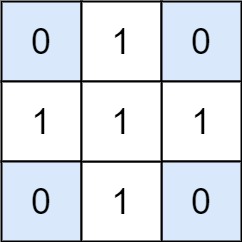1074. Number of Submatrices That Sum to Target
Hard
Input: matrix = [[0,1,0],[1,1,1],[0,1,0]], target = 0
Output: 4
Explanation: The four 1x1 submatrices that only contain 0.Input: matrix = [[1,-1],[-1,1]], target = 0
Output: 5
Explanation: The two 1x2 submatrices, plus the two 2x1 submatrices, plus the 2x2 submatrix.Input: matrix = [[904]], target = 0
Output: 0Same concept as https://leetcode.com/problems/subarray-sum-equals-k/
Last updated
